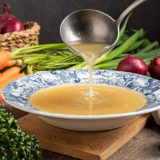Typically found at salad bars soaked in vinegar, beets are far from America’s favorite food. However, the cool reception beets usually get could change drastically if more people discover how sweet and delicious this root vegetable can be – and if they knew how much of a positive impact beets have on human health. Although there are several reasons beets are coveted by nutritionists, new research demonstrates that this ruby red veggie possesses the unique ability to squash fatigue by improving stamina and energy levels.
A location known to have produced more than their share of centenarians, Russia prizes beetroots. Frequently eaten pickled or in borscht (a traditional Russian beet soup), the longevity of the Russian people could be partly due to consumption of this vegetable. Containing powerful nutrients that protect against heart disease, birth defects and cancer, it is no wonder that beets have been used medicinally for centuries.
Beets contain a variety of substances that continually push it to the forefront of healthy food options. A handful of those substances include:
- Betacyanin – The pigment that gives beets their rich, purple-crimson color, betacyanin is a powerful antioxidant and cancer-fighting agent.
- Fiber – Known to help remove cholesterol from the body and improve digestive health, beets are high in fiber.
- Betaine – Found naturally in beets, betaine is associated with lower levels of inflammatory markers (C-reactive protein, interleukin-6 and tumor necrosis factor alpha) in the body. Each of these markers of chronic inflammation has been linked to a wide range of conditions, including heart disease, osteoporosis, cognitive decline, Alzheimer’s and type 2 diabetes.
- Folic Acid – Also known as vitamin B9 or folate, folic acid is essential for normal tissue growth. Eating folate-rich foods is especially important during pregnancy. The daily requirement for folate is 400 micrograms. Just one cup of boiled, sliced beets contains 136 micrograms of folate.
- Iron – Easy for the body to assimilate, beets are a good vegetable source of iron – a mineral needed for those with anemia.
While the substances listed above may play a role in minimizing fatigue – especially tiredness associated with iron-deficient anemia – there is another factor involved in beets’ ability to beat fatigue. Because it increases the amount of nitrate in the bloodstream, a new study concludes that drinking the juice of beetroots reduces the rate at which muscles use their main source of energy. Researchers from the UK University of Exeter’s School of Sport and Health Sciences found that drinking organic beetroot juice boosts stamina and could help people exercise for up to 15 percent longer.
- According to lead author Professor Andy Jones, “Our study is the first to show that nitrate-rich food can increase exercise endurance. We were amazed by the effects of beetroot juice on oxygen uptake because these effects cannot be achieved by any other known means, including training.”
- Although the research was performed on highly conditioned athletes, the researchers believe that the same mechanism responsible for beets’ increase in muscular energy is likely to increase energy levels in everyone.
The scientific evidence for beetroot as a means to relieve fatigue is in its infancy. However, this vibrant vegetable’s long history of promoting a long, healthful life adds to its credibility. Most people who experiment in the kitchen with beet’s sweet, earthy roots quickly develop an appreciation for these orbs, whether it’s because they taste good, are a virtual super health food or because they notice that eating beets helps enhance their stamina and energy levels.




